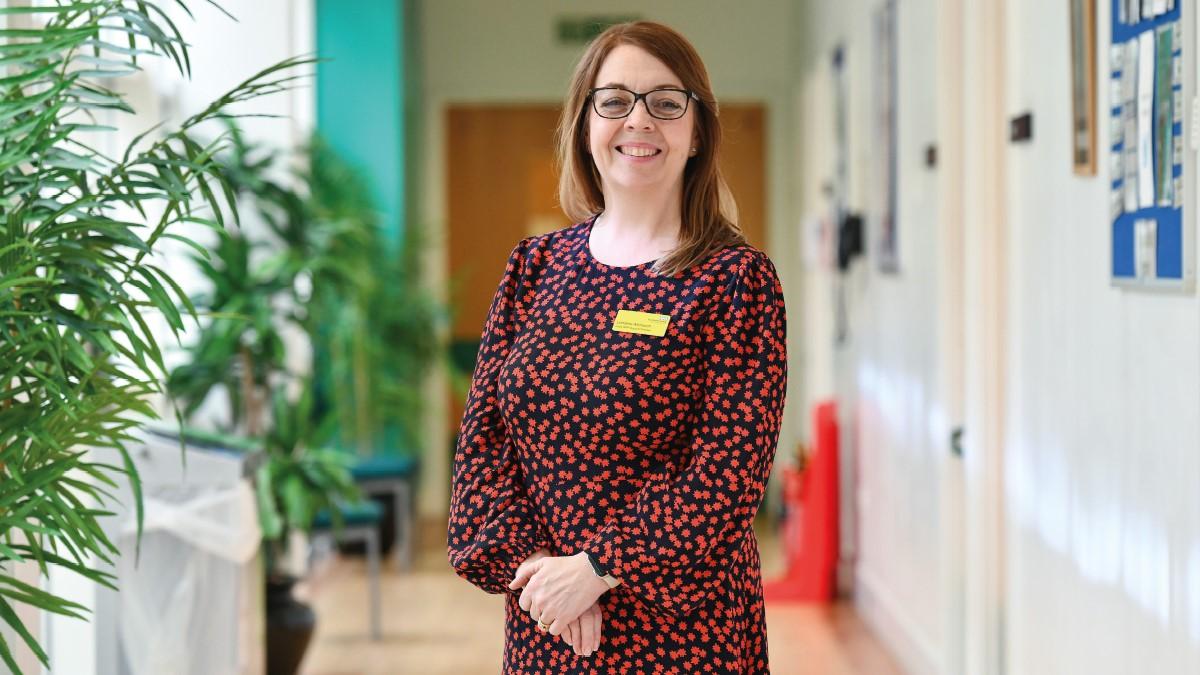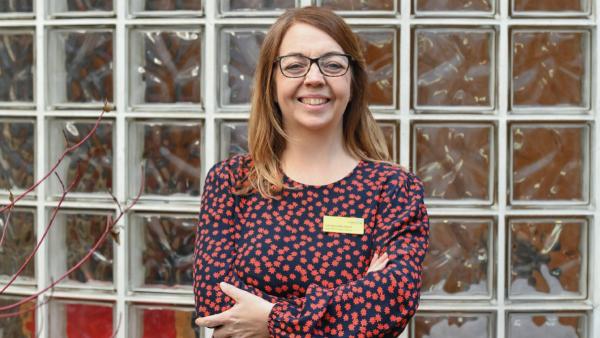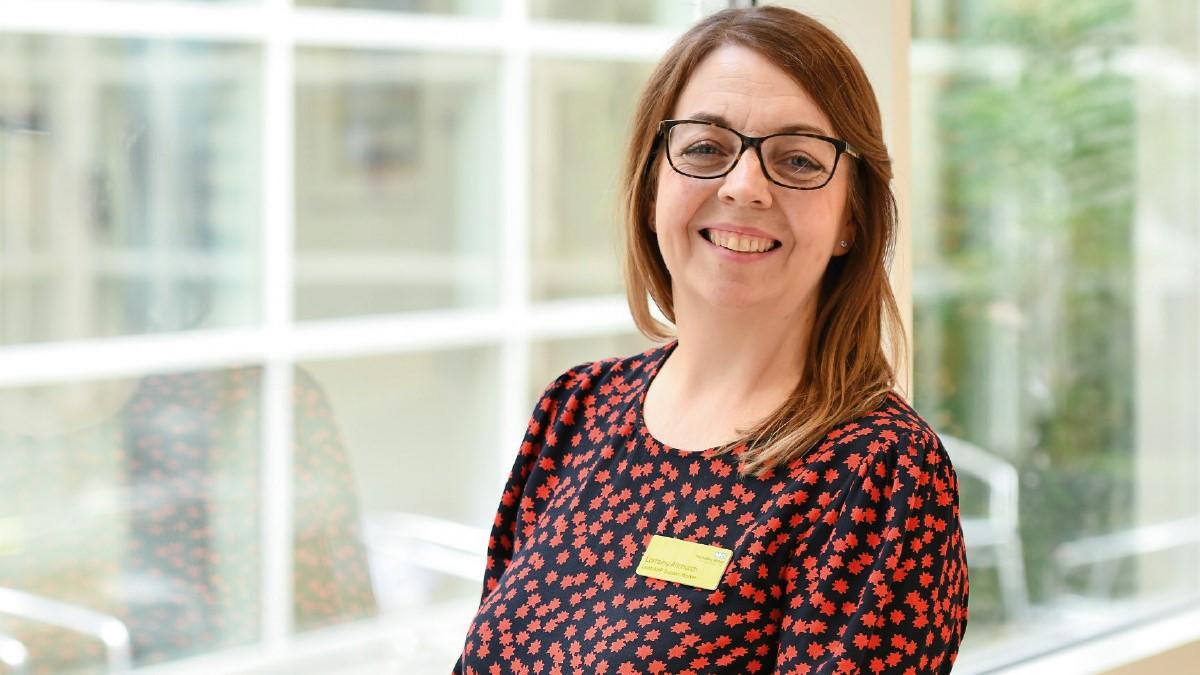Lorraine Allchurch has won a prestigious national award recognising her work in providing training and career development. Mark Gould discovers more

Lorraine Allchurch started her working life as a chef and never considered a role in a caring profession. But her work to develop and enrich the working lives and careers of fellow physiotherapy support workers and other allied health professions (AHPs) has now won her a prestigious national award celebrating ‘outstanding leadership’.
Lorraine is a CSP activist and system lead AHP support worker for the Black Country ICS . Her work, giving a voice to support workers and helping them gain qualifications and skills to improve care and enhance their careers, has been recognised in the national Celebrating Inspirational Allied Health Professions Support Workforce awards.
In a letter notifying Lorraine of her award, Helen Marriot, Midlands regional head of AHPs at Health Education England, described her ‘fantastic accomplishment’ in beating 463 other nominees. The letter continues:
‘This award celebrates someone who values and demonstrates inclusive, empathetic, outstanding leadership. They are self-aware whilst being an excellent role model, striving to inspire and develop others with a clear line of sight to patient care. These are all values that you clearly display every day and the nominations we received from your colleagues highlighted these qualities in abundance.’
Lorraine has helped around 180 support workers across her trust, and in the wider area, to come together to realise their own value and be made aware of the significant career opportunities within their grasp.
It’s getting support workers to think differently about what leadership means...It’s about influencing for others, listening to others, role modelling for them.
Lorraine was part of a collaborative project with colleagues from the trust organisational development department and external partners from the local Dudley College and AHP programme lead from the Black Country AHP and nursing faculty. The outcome was the development and implementation of two, free training courses, the higher development award with funding from the West Midlands combined authority initially for a cohort of 12 support workers from across the Black Country ICS.

It was designed with the input of support workers themselves, to develop ‘soft leadership skills’. Based at Dudley College the first course sets out the principles of team leading, including introductions to improvement/change projects, building working relations, communication, equality and diversity and maths and English refresher sessions.
The second course, which leads to a certificate in the principles of management and leadership, develops on the first and adds in managing a team to deliver good results, developing and sharing good practice, and responding to conflict in the workplace.
‘The courses take up just one day a month for eight months. So its achievable for the service to release staff, there is not a big demand on staff to do lots of essays and so on. It’s a short course designed to give skills and confidence and ignite learning, and out of that the next step is an NHS-focussed career conversation,’ Lorraine explains as we meet in the trust headquarters.
‘It’s getting support workers to think differently about what leadership means. What I say to people is you don’t need to go into “leadership” to do the courses. It’s about developing your skills locally, looking at the modules and saying “oh, yes I really want to do that”,’ she says.
Lorraine pauses to gather her thoughts when I ask what leadership skills are. ‘It’s about influencing for others, listening to others, role modelling for them – they may not do what I do, or want to, but they can still develop within their role.’
Leading fellow support workers
Lorraine started her working life as a chef but she says her mum, who was a care assistant in a residential home, always wanted her to have a career in the NHS.
‘When I had my family I was looking at a career change and, while it was something I thought I could never do, at 29, I got a job as an auxiliary nurse at the Queen Elizabeth Hospital in Birmingham and never looked back. I absolutely loved helping others, especially those who can’t do things for themselves.’
Lorraine then started looking at what was available in terms of career progression without going down the registered route, when a band 3 therapy assistant role blended across the disciplines of physiotherapy and occupation therapy came up in Dudley. ‘I liked the sound of that as my mum had significant spinal rehabilitation,’ she says.
Working as an assistant therapy practitioner with the frail and elderly gave her more autonomy which she ‘absolutely loved’. She still does clinical shifts to keep up her competency, and she wants support workers to recognise, ‘I am still a support worker, leading them as one of them’. Lorraine was intrigued by the idea of leadership and wanted to do more without going into formal training. With the encouragement of her department, she contacted the CSP via a local focus group and met some support workers who were working up to band 6.
She also took part in the CSP Annual Representative Conference review which made her realise that, although she wasn’t registered, her voice and experience mattered.

Ageing workforce
Support workers are one of the continuity posts in any trust. A relatively stable workforce, largely female, with local roots, but it is an ageing workforce. ‘We need to be mindful that their skills and experience could be lost in the next 10 years and we need to develop new workers coming in. And that’s where I come in in terms of the culture change that is needed in learning and development – a levelling up.’
Health Education England’s AHP support worker competency education and career development framework, published in 2021, was designed to help trusts plan, develop and deploy their AHP workforce. In clinching the post of system lead support worker, Lorraine received extra help and support in developing leadership and management skills.
She organised focus groups and forums at trust level and across the Black Country to hear grassroots voices explain the barriers to career development, so she could feed these views directly back to senior managers across the region.
It became clear that support workers were simply unaware of career development opportunities. ‘Now workers want to know what is available and want the learning time in equal proportion to the rest of the workforce because we treat the same patients. We also want our work recognised – we are a valuable part of the NHS and services couldn’t run without us.’
While support work can be a ‘pipeline to a registered profession’ Lorraine wants to see more extended scope practitioners and, with careful planning, more support workers at clinical band 5. ‘We can’t as support workers do the same realms of scope as new graduate band 5s. However, a really experienced support worker can extend their scope in a defined area so they can do so much more and that can help to ease NHS workforce problems.’
Responsible leadership
Lorraine feels there was no particular moment when it dawned on her she was a leader.
‘It was a bit of an evolution, took a while to sink in, and that could be down to personality and self-confidence. It’s a responsibility leading others, listening to them, making sure you are hearing what they are saying.’
She is grateful to the help and support of Karen Lewis, the chief AHP at Dudley Group, and Jenny Glynn the AHP professional lead at the trust.
‘I wouldn’t be here without them,’ she says. ‘They recognised the leadership skills in me that I wasn’t recognising, supported me in my transition to a leadership role and coached and mentored me. I never felt out of my depth because they were there for me. But I wasn’t confident. People might have thought I was but under the table my legs are shaking.’
Lorraine wants a future in management but not one that distances her from her day job. ‘I want to stay close enough to the people that I am leading but in a position that I can influence for them as well, giving them confidence to get out of their silos.’
Number of subscribers: 2




































